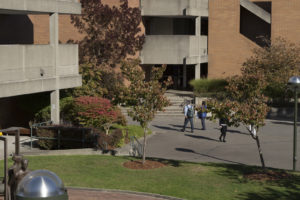Neurodiversity Navigators at Bellevue College
Our mission is to provide educational opportunities to increase self-knowledge that lead to successful academic outcomes in the areas of executive functioning, self-regulation, social interaction, self-advocacy, and career preparation, along with advocacy and access services for neurodivergent students; and to actively promote a campus and community environment of inclusion and understanding of students, faculty and staff with neurological differences.
Watch this 1 minute video to hear more.
Learn to Rely on Strengths in these Areas of Focus:
Executive Functioning
Task Initiation, Organization and Planning, Time Management, Stress Tolerance, Flexibility, Sustained Attention, Emotional Control, Goal-Directed Persistence, Response Inhibition, Working Memory, Metacognition
Social Interaction
Understanding one’s social interaction preferences and strengths; Join a campus club if desired; Make friends on campus if desired, Work in a group
Self-Advocacy
Know when you need help, know who to ask, how to ask, when to ask
Self-Regulation
Handle changes to schedule and/or plans; Think of solutions to problems; Handle feelings in order to be able to continue class and class work, and achieve personal goals
Program Components:
- Regular Meetings with trained Peer Mentor
- Cohort Orientation in August prior to First Year
- Career Preparation class each quarter (as part of an eight-course series) with other program students (credits and topics vary – see below and come to Information Session for more detail or inquire.)
- Quarterly parent meetings
- Facilitated Communication with instructors
- Campus Awareness & Training
The Neurodiversity Navigators Program currently serves Bellevue College students who identify as autistic or neurodivergent. Students must self-identify as autistic or neurodivergent, must wish to be part of the program, and must agree to participate in all program components listed above and discuss any participation concerns with program leads.
See our Future Students page to learn more.
More information:
- Information Sessions (watch information videos on this page)
- Testimonials
- Program Requirements
- Next Steps
- Neurodiversity Navigators Program Flyer
- Neurodiversity Navigators Course Sequence
Last Updated January 25, 2024

